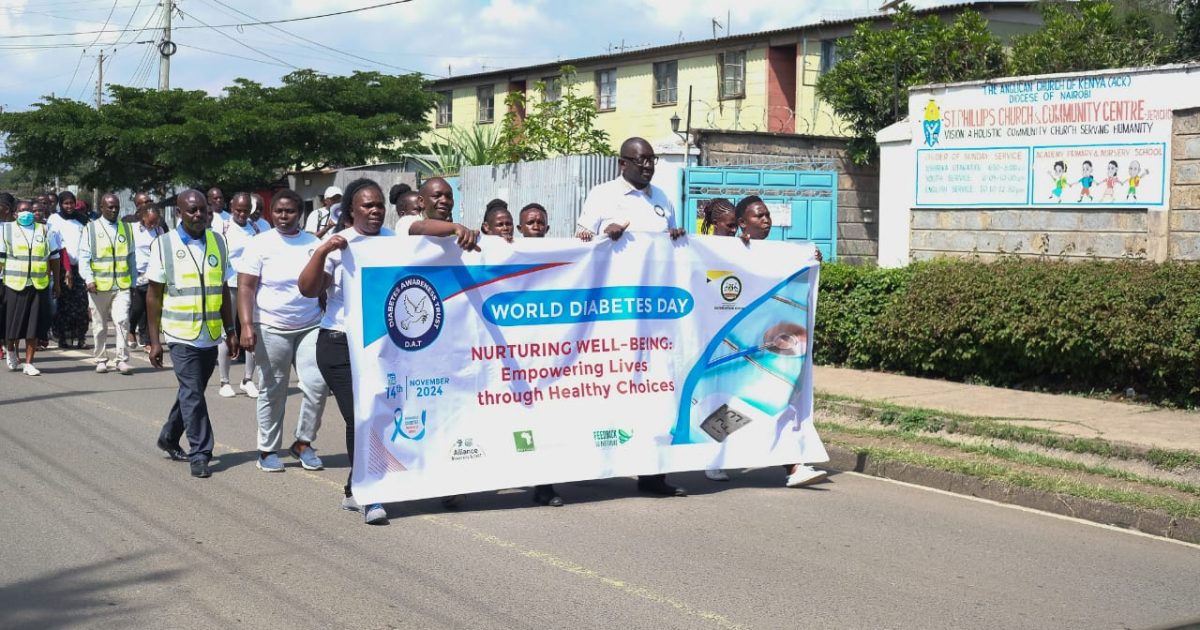The Diabetes Awareness Trust has initiated a sensitisation campaign to create awareness on healthy living by promoting food safety and eating of organic foods to enhance management and prevention of diabetes and other NCDs.
Makadara Sub -County health department in collaboration with Diabetes Awareness Trust (DAT) on Thursday organised a walk in Jericho area of Nairobi to commemorate World Diabetes day.
World Diabetes day is the primary global awareness campaign observed on November 14 each year to increase awareness on diabetes, frequently focusing on important topics like nutrition, physical activity, mental health, or access to healthcare for people with diabetes.
The DAT programme officer Elizabeth Njoka said DAT is collaborating with the department of health in implementation of project activities in the Viwandani area and educating the public on diabetes management and the benefits of eating organic foods.
“Many families are not consuming safely produced foods. This puts the residents at risks of contracting non communicable diseases,” said Njoka.
She said that in the Viwandani area, DAT has expanded its community engagement by working closely with the LungaLunga Heath Centre facility to provide information and care management of people with diabetes.
“We have observed a notable shift in consumer behavior towards prioritising food safety, evidently by increased home gardening initiatives in the Viwandani area,” she said, adding this shift reflects growing community resilience and self-sufficiency in food production.
She revealed that DAT’s consumer information and nutrition education programme achieves substantial impact, with initiatives such as community health worker training, family counseling, cooking demonstrations, and efforts to establish consumer network.
“The cooking demonstration not only introduced indigenous leafy vegetables but also revived interest in traditional dietary practices,” said Njoka.
“This has resulted in increased consumption of nutrient- rich indigenous foods, contributing to better nutritional outcomes in the community,” she further said.
However, Njoka observed that with progress comes challenges. The increasing demand for organic produce in our communities underscores the need for continued advocacy and support for local farmers.
She said as a key stakeholder in the review of the Nairobi County Nutrition Plan, DAT lobbied for policies supporting safe food production and better access for residents.
Makadara Sub County Medical Officer of Health Hassan Suleiman on his part said that 460 people are living with diabetes in every 10,000 populations in Kenya.
“Around 460 people out of every 10,000 populations suffer from diabetes in Kenya,” said Suleiman adding that as a sub county level they have community health promoters who help in creating awareness on the benefits of screening early for diabetes and other non-communicable diseases.
Suleiman said that according to the World Health Organisation (WHO) the prevalence of Diabetes in Kenya is 3.3 percent adding it is estimated to be growing, and that by 2025, the country is likely to reach 4.5 percent of the prevalence.
He observed that there is quite a huge number of undiagnosed cases of diabetes within the community since many people in the area do not undergo screening for diabetes.
“We encourage our people to go for screening early to prevent deaths and also contain the disease,” he said adding that even if the test comes out positive, one can live a long and healthy life if they adhere to proper medication and a healthy lifestyle.
Suleiman said for those people who are living with diabetes and other NCDs, they can access medical services and health education at their nearest health facility.
He said that some of the complications arising from diabetes mismanagement include renal failure, blindness, amputation of the leg among others.
“All these complications can be averted if we have done proper preventive measures at community level,” he said adding that the department has established and implemented a primary health care network where Community Health Promoters (CHPs) are used to reach residents at grassroots level.
Rosemary Wanjohi, a resident in Jericho town, has been living with diabetes for the past twelve years.
She narrates that she found out that she was sick in 2012 when she was at work when she collapsed and was rushed to hospital for medical attention.
“I started feeling drowsy and then I lost consciousness. When I woke up I found myself in hospital,” she said adding that earlier she had experienced symptoms like frequent urination and fatigue which had persisted for some time.
Wanjohi said when she was screened for diabetes, the results for the tests revealed that the reading was 33 which is very high. She was immediately put on medication and taken through proper management of the disease.
She said that eating healthy foods and maintaining a balanced diet has been part of the reason why her body has remained healthy and strong.
“Once you accept your condition, eat healthy foods and take medication as prescribed by a health care provider, one can live a fulfilling life,” she said.
This year’s theme, “Breaking barriers, Bridging gaps,” underpins the commitment to reduce the risk of diabetes, and ensuring that all people who are diagnosed with diabetes have access to equitable, comprehensive, affordable and quality treatment and care.
By Anita Omwenga





